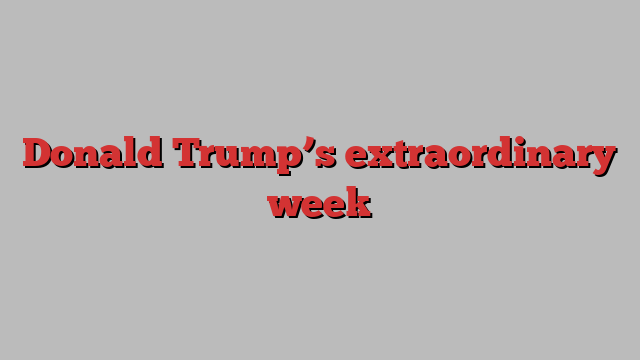
Unlock the US Election Countdown newsletter for free
The stories that matter on money and politics in the race for the White House
Even by his tumultuous standards, Donald Trump has had quite a week. On a sunny afternoon last Saturday he narrowly survived an assassination attempt when a gunman fired at him while he addressed a rally in Pennsylvania. One bullet came so close it nicked his right ear. Displaying the instincts for pugnacious imagery and rhetoric that have long served him well, the Republican presidential nominee shook his fist and shouted “Fight”, even as he was hustled, bleeding, from the scene.
Just two days later the former US president was back on stage at the Republican party convention in Milwaukee, sporting a bandage over his ear, and beaming. He had just unveiled JD Vance, a full-throated and youthful backer of his “America-first” doctrine, as his running mate, underlining how the party is fully Trumpian now and how his nationalist populism could dominate it long into the future. He also clearly sensed he had a fresh following wind for the election in November — as he has.
As if on cue, Silicon Valley and the courts lent an obliging hand to his cause. Elon Musk and other tech titans came out for Trump soon after the shooting, pledging to fund his campaign. On Monday another plank in what at the start of the year had seemed a formidable legal edifice in his path fell away. A Florida judge — a Trump nominee — dismissed a criminal case against him over the handling of classified documents. Sometimes, a week really is a long time in politics.
Election day is still more than three months away. Trump, while relatively measured this week in his oratory, is volatile, ornery and unpredictable. In a febrile political environment such as America’s, and with an electorate so polarised, the narrative of the race can be reversed. Even so, however, it seems clear that the shooting and the tightly-scripted convention have reinforced what had already been shaping up as a commanding position for Trump in his rematch against President Joe Biden. Opinion polls suggest the Republican is ahead in all the battleground states.
The selection of Vance, a 39-year-old first-term senator, only intensifies the Democrats’ discomfiture. He has a compelling back-story via a hardscrabble upbringing, and is strikingly young when set alongside the two presidential candidates. Vance may help turn some of Biden’s must-win rustbelt states red. But that is not the main lesson to draw from the selection of the Trump-sceptic-turned-soulmate. Trump was not looking for a swing-vote whisperer; he was looking ahead: Vance embodies how the angry anti-globalist and isolationist spirit of Make America Great Again can outlast Trump.
As for the Democrats, the shooting diverted public attention from their agonising over the frailty of Biden, which was calamitously on display in last month’s debate with Trump. But the respite was brief. The contrast between the seemingly united, vibrant and strategic Republican party and the Democrats, disunited over whether to stick with their candidate or not, is striking. So too, however unfairly, was the contrast between the ebullient Trump shrugging off an assassination attempt and the president having to suspend his campaign because he had Covid.
Biden has been a doughty president and a staunch advocate for democratic values in America and alliances abroad — in marked contrast to Trump, a convicted felon who admires autocrats and disdains allies. But Biden should now heed the growing pressure from senior Democrats to step aside in favour of a more vigorous nominee. If not, there will sadly be one thing that unites both parties on election day: in serving up two candidates who are patently unfit for the demands of high office — one through personality and record, the other through infirmity — their elites will have failed America, and the world.